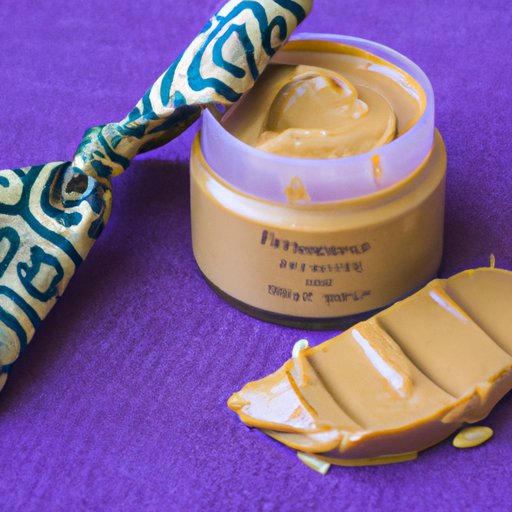
Introduction
Have you heard that peanut butter can help you gain weight? It’s true, but there’s more to it than just eating jars of peanut butter. There are healthy and effective ways to use this delicious spread for weight gain. In this article, we’ll explore the science behind using peanut butter for weight gain, and we’ll provide tips for using it in a healthy and affordable way.
The Science Behind Gaining Weight with Peanut Butter
Peanut butter is rich in calories and protein. Two tablespoons of peanut butter contain around 190 calories and 8 grams of protein. This nutrient profile can be helpful for people who want to gain weight in a healthy way. Consuming more calories than your body needs will lead to weight gain, but it’s important to consume nutrient-dense foods too.
Research has shown that peanut butter can be an effective food for weight gain. A study published in The American Journal of Clinical Nutrition found that adding peanut butter to the diet of underweight children helped them gain weight without affecting their overall cholesterol levels. Another study published in The Journal of Applied Physiology found that consuming peanut butter in combination with weight training led to greater gains in muscle mass compared to consuming only carbohydrates or a placebo.
Incorporating Peanut Butter into Your Diet for Healthy Weight Gain
The key to using peanut butter for healthy weight gain is to include it as a part of a balanced diet. Here are some tips:
Suggestions for using peanut butter as a spread or dip for fruits and vegetables
Instead of using high-calorie and high-fat spreads, like butter or cream cheese, try peanut butter. This will add some healthy fats and protein to your meal. Cut up some apples or celery and enjoy them with peanut butter.
Tips for adding peanut butter to smoothies or oatmeal for added calories and protein
If you’re someone who likes shake or smoothies, there’s nothing better than adding a teaspoon of peanut butter to your drinks. Not only will that give you a bit of nutty flavor, but it also adds more calories and protein. Add a scoop of peanut butter to your oatmeal for a hearty breakfast.
Ideas for incorporating peanut butter into snacks and desserts
Peanut butter is great with crackers or rice cakes, which are both low-calorie snacks. Mix peanut butter with plain yogurt and honey to create a delicious and healthy dip for fruit. Make peanut butter balls by mixing peanut butter with honey and oats and rolling the mixture into small balls. Freeze them for a quick and easy snack.
Peanut Butter for Muscle Mass
Protein is essential for building strong muscles and repairing them after exercise. Consuming enough protein is important for people who want to develop muscle mass. Peanut butter is a good source of protein, with 8 grams of protein per 2 tablespoons. By consuming peanut butter alongside other protein sources, like lean meats or fish, people can maximize their muscle-building potential.
Balancing Peanut Butter with Other Foods for Healthy Weight Gain
While peanut butter can be a great addition to a healthy weight gain diet, it’s important to balance it with other nutrient-dense foods. Eating a variety of fruits, vegetables, whole grains, and lean proteins will ensure that your body gets all the nutrients it needs. Consider pairing peanut butter with foods like:
- Whole grain bread
- Celery or apple slices
- Smoothies with vegetables and fruit
Remember that moderation is key when it comes to peanut butter consumption, as it does contain saturated fats and can be high in calories. Be mindful of portion sizes and try to avoid overconsumption.
Peanut Butter for Weight Gain on a Budget
Peanut butter can be an affordable option for weight gain, especially when compared to other protein sources. If you’re on a budget and want to use peanut butter, here are some ideas:
- Try store-brand peanut butter instead of name-brand
- Look for sales or discounts on peanut butter
- Buy peanut butter in bulk
- Compare the cost of canned beans and dried beans to peanut butter
Risks of Overconsumption of Peanut Butter for Weight Gain
While peanut butter can be a healthy addition to a weight gain diet, consuming too much can be harmful. Overconsumption of peanut butter can lead to excessive weight gain, which can have negative consequences for health. Additionally, peanut butter is high in saturated fats, which can increase cholesterol levels and risk of heart disease. It’s important to balance peanut butter consumption with other healthy foods and to consume it in moderation.
Conclusion
Peanut butter can be a delicious and healthy food to add to your diet for weight gain. By using it in combination with other nutrient-dense foods and using portion control, you can see healthy and sustainable weight gain. Remember to consider the impact of peanut butter on your budget and enjoy it in moderation.
So, the next time you’re making a grocery list, don’t forget to add a jar of peanut butter. With the tips presented in this article, you can enjoy all the benefits it has to offer.




